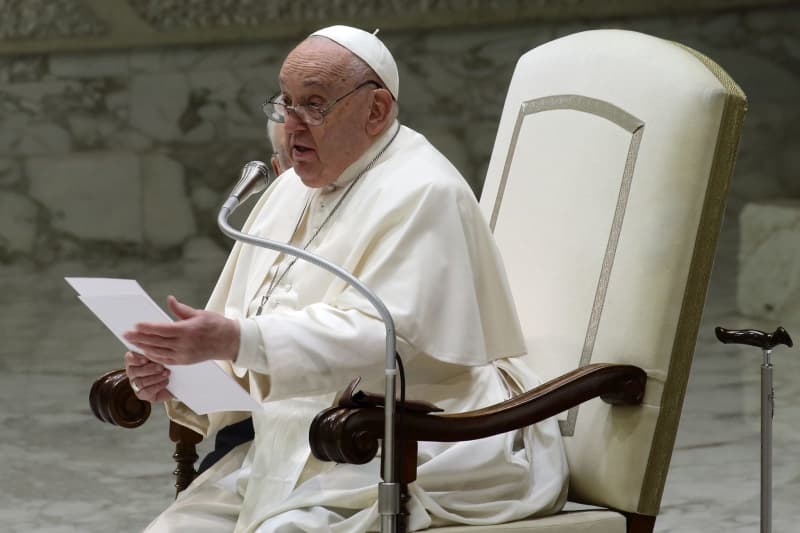In a poignant address delivered at the Vatican, Pope Francis expressed profound sorrow over the devastating consequences of the ongoing war in Gaza, particularly highlighting the tragedy of children affected by the conflict. Referring to the horrific airstrikes that have plagued the territory, the Pope denounced such acts as “cruelty,” emphasizing that the situation transcends the boundaries of traditional warfare. His emotionally charged remarks came in the wake of recent bombings that claimed numerous innocent lives, resonating with a global audience, particularly among the Catholic Church’s 1.4 billion adherents. The Pope’s emphasis on the humanitarian crisis aims to resonate with the moral imperatives of compassion and protection for the vulnerable, especially children who have borne the brunt of this conflict.
The Vatican’s message and the Pope’s condemnation of violence did not go unnoticed by Israeli officials, who expressed disappointment with his comments. In their response, Israel’s Foreign Minister Gideon Saar reiterated the complexity of the situation, asserting that the Pope’s acknowledgment of cruelty overlooked the multi-faceted nature of Israel’s conflict, which is framed as a war against terrorism. Saar’s statement highlighted the duality of interpretations surrounding the conflict, where acts of violence and loss are perceived differently by the involved parties. This exchange underscores the challenge of reconciling international opinions on wartime actions, particularly regarding accountability and the narrative surrounding civilian casualties.
In his address, Pope Francis also lamented Cardinal Pierbattista Pizzaballa’s inability to enter Gaza due to ongoing Israeli airstrikes, noting the promise made to facilitate his access to the region. This incident reflects the broader theme of religious leaders struggling to fulfill their humanitarian missions amidst escalating violence. The Pope’s concern for the well-being of his hierarchical representatives illustrates the overarching priority of the Church to provide support and care in crisis zones, fostering dialogue and peace amid turmoil. By highlighting Cardinal Pizzaballa’s plight, Pope Francis aims to draw attention to the broader implications of restricted access for humanitarian aid workers in conflict-ridden areas.
During an interview prior to his address, the Pope elaborated on the nature of the Gaza conflict, describing it as an arena of “criminal acts” that violate the principles of conventional warfare. He drew parallels with the situation in Ukraine, arguing that the fundamental principles of humanity and the protection of civilians are being disregarded in both contexts. The Pope’s critique suggests a call for reflection on the moral implications of military actions and challenges the legitimacy of warfare that sacrifices civilian life. This rhetorical stance positions the Vatican as a powerful voice for peace, urging both sides to reconsider their strategies and prioritize humanitarian considerations in their engagements.
Saar’s counter-argument highlighted the perspective of the Israeli state, which frames its military actions as necessary for self-defense against ongoing terrorism, particularly from groups like Hamas. The Israeli Foreign Minister pointed out that the cruelty lies in the tactics utilized by terrorists who endanger children while seeking to harm innocent civilians. This contention encapsulates the deeply ingrained perceptions of right and wrong in wartime rhetoric and paints a complex picture of the conflict where both sides fight for their narratives—Israel’s defense and Hamas’s insistence on liberation. Saar’s response exemplifies how narratives are often polarized, complicating the dialogue surrounding international recognition and understanding of the ongoing violence.
At the heart of the conflict lies the tragic escalation that began on October 7, 2023, when a devastating assault by Hamas and other militant groups resulted in the horrific loss of 1,200 lives in Israel, alongside the abduction of around 250 hostages. This act ignited a fierce military response from Israel, leading to a cycle of violence that has resulted in a staggering loss of life in Gaza—reported to exceed 45,100 casualties according to Palestinian sources. Such statistics reflect the catastrophic humanitarian fallout of the war, illustrating the desperate circumstances faced by civilians, particularly women and children. In this context, Pope Francis’s emphasis on compassion serves as a moral imperative, beckoning the international community to engage in serious dialogue aimed at de-escalation and relief efforts.
Ultimately, Pope Francis’s address serves as a clarion call for humanity amid a backdrop of escalating violence and suffering. By advocating for compassion and questioning the validity of wartime actions that harm the innocent, he aims to inspire a re-evaluation of the ethical implications of conflict. The responses from Israeli officials illuminate the stark divisions in perspectives regarding the conflict, emphasizing the necessity for nuanced dialogue and understanding. As the war in Gaza continues to unfold with devastating consequences, the role of religious leaders, humanitarian figures, and global citizens becomes increasingly critical in the pursuit of peace, urging all parties involved to foster a path toward reconciliation, understanding, and conflict resolution.

